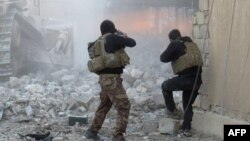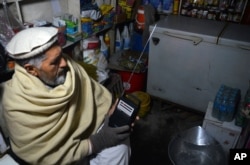U.S. Secretary of State John Kerry said at a recent Rome meeting of the coalition fighting the Islamic State (IS) group that the challenge now is to push ahead with a strategy that will work, giving the militants "no time to regroup, no place to run, no safe havens in which to hide.”
Accelerating the military campaign is key to curbing IS's global ambitions, said David DesRoches, an associate professor at the Center for Strategic Studies of the National Defense University in Washington.
For one thing, he said, strangling the terrorist group undermines its claim that is always growing.
“In military movements, momentum builds on momentum, and once the progress of Daesh is arrested and turned back, people would move away from the tarnished brand,” DesRoches said, using a common name for the IS organization, which also goes by ISIS and ISIL.
Alberto Fernandez, former director of the State Department’s Center for Counterterrorism, said the global strategy has to take into account the aftermath of military acceleration against IS in Syria.
“The question is what happens as Daesh is pushed back, who benefits, who replaces them," he said.
The coalition says it has pushed Daesh out of 40 percent of the territory it had gained in Iraq and 20 percent in Syria.
Expansion in Libya
But Fernandez said consideration must also be given to Libya, "which is becoming the second option for its recruits if they can’t make to Syria or Iraq.”
DesRoches said Libya has to be taken into account in any anti-IS strategy.
“The continued political division in Libya is a real challenge to any global strategy to contain and destroy Daesh,” he said. “Without a unified government in Libya, there is no way to build an effective local force to fight Daesh expansion in the country.”
DesRoches noted that the concluding statement from the Rome meeting ignored some root causes of violent extremism, such as political exclusion and poor governance throughout the region.
“What is needed is emphasis on governance, because people join Daesh when they feel desperate and have no other option,” he said. "At the end of the day, poor governance is the magnet for Daesh recruiting.”
He said that was the case in Syria, Iraq and Libya, and it is looming in Egypt, where a harsh crackdown is becoming counterproductive.
Growth claim
DesRoches noted that Daesh has been playing a game of expanding to other countries so it can claim the caliphate is growing. The group is adopting a model of taking an existing extremist group like Ansar Bait al-Maqdis, a jihadist group based in Egypt, and getting its members to pledge allegiance to IS.
IS has recruited thousands of fighters, relying on its savvy use of propaganda and social media.
IS's ideological message sounds the alarm that Muslims are being slaughtered. It tells Muslims that they have a role to play in fighting for a utopian Islamic caliphate.
In remarks made during his visit this week to the Islamic Society of Baltimore, President Barack Obama warned young American Muslims about the false claims of the group.
“Groups like ISIL are desperate for legitimacy," Obama said. "They try to portray themselves as religious leaders and holy warriors who speak for Islam. I refuse to give them legitimacy. We must never give them that.”
Experts say a global strategy to counter IS's message would require a massive effort by Muslims around the world.
“You need Muslims who are people of conviction, who are eloquent people in social media space, challenging the discourse of the extremists,” Fernandez said.
“There should be professionals who actually engage these people and seek to sway them from the path they have taken,” he added.
Massive response urged
Fernandez noted that volume has value and IS — either itself or with its networks — still has the advantage in numbers. He recommended a massive response to counter IS propaganda on all sorts of social media platforms. He advocated "flooding the space with material by others, realizing that one of the most powerful messages is the power of an individual to individuals.”
But DesRoches argued that there is a need to do more than just challenge the false claims of IS.
“People who have been involved with the group and have seen the reality and became disillusioned — those are the most powerful voices we can put on social media,” he said.







